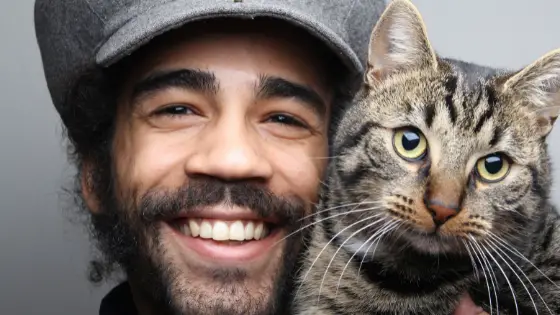Updated 9/2023
If you have a little guy or girl that used to purr a lot and loudly and you have recently noticed that your cat has stopped here are six possible reasons.
Cat’s purring can mean different things and some cats purr all day, when they are eating, when they’re playing, walking, or even sleeping so you may want to know why cats purr.

Why do cats purr?
Kittens start to purr early on as a bonding mechanism between them and their mothers. There has been some research about exactly how and why cats purr but it continues to be a slight mystery as to the exact mechanism and how they make the purring sound. Some research shows that purring results from intermittent vibrations in the laryngeal muscles.
Purring is a form of communication for cats and it is also a self-soothing mechanism that can help calm them and many times their human as well since research shows that cat owner’s stress levels decrease when interacting with their cat.
A cat’s purr is not only soothing to them, but it can also be soothing for many cat owners.
Also, it’s not just domestic cats that purr! Large cats like lions and tigers purr as well.
There are many myths told about cats that stop purring three of the biggest are:
- My cat isn’t happy if they don’t purr
- My cat is sick if they stop purring
- Cats that stop purring are going to die soon
While all of these can be true at times, it is more likely something less serious. If your cat has stopped, you may be asking yourself why doesn’t my cat purr anymore?
Let’s look at 8 reasons why your cat might stop purring
8 possible reasons your cat has stopped purring
If you are asking yourself ‘Why does my cat not purr anymore’? One of these eight things may be the reason.

1. Changes in the environment
Cats are extremely sensitive to changes in their environment and if you have noticed that your cat used to happily purr constantly but suddenly stopped think about if there have been any changes to their environment.
Has another cat or pet been introduced to the environment or have you been upset lately and unable to show them as much attention and affection as you previously did? Did you have a baby or have you moved recently?
Thinking about any changes in the home (even small ones) may help determine if that is the cause of your cat’s decreased purring.
2. Illness
Normally, cats purr when they are happy and content but if your cat is ill they most likely won’t purr a lot.
Consider how you feel when you’re sick, you may be a little mopey and not want to talk or chat a ton. Your cat feels the same way when they are under the weather.
Pay close attention to your kitten and see if there are other signs of illness like fever, coughing, sneezing, ocular or nasal discharge, vomiting, or diarrhea. If you notice any additional symptoms you may want to take your cat to the vet as soon as possible.
3. Stress
Much like illness, cats who are stressed or don’t feel completely safe in their environment may not purr. Things that we may think are small such as being bullied by another cat, introducing another pet (or person) into the home, getting vaccinated, moving, or loud noises from construction may all be sources of stress for your cat.
Cats who are stressed are usually pretty silent and you may also notice your cat hiding or withdrawing and not talking back to you if they did so before. Another sign of stress is if you notice your cat pulling out his or her own fur by excessive licking.
4. Sulking
Yes, cats can be drama queens and kings! The slightest change can cause them to have a temper tantrum which may include something as big as starting to use the litter outside of the litter box, terrorizing other pets or simply not purring
If you have recently changed the food, the type of litter, or even where you placed the litter box. These actions are enough to send your cat down a woe-is-me spiral which may include a decrease in their normal purring
5. Age
Just like people, older cats tend to calm down as they get older. As your kitten is becoming a ‘teenager’ or adult they may decrease in their rambunctious ways and purring or may not purr as loudly as they did in the past.
Listen for your cat purring when the home is silent and you two are just resting or cuddling together you may notice that it is just much softer than it previously was.
6. Feral Cats
It has been shown that feral cats purr a lot less than those that were not. The theory is that their mothers deterred them from purring as kittens to decrease the chances of them getting noticed by a predator.
7. Injury to their vocal cords
As we stated cats purr from their voice box and if it is injured it can prevent your cat from purring. This can be due to a physical injury, neurological issues, cancer, autoimmune diseases, or an infectious one such as a bacterial infection. And yes, cats can get laryngitis!
8. Softer purrs
As stated earlier many cats begin to purr a lot softer as they age, so it could be that your cat is purring, you just don’t hear it.
5 things you can do to encourage your cat to purr more
Here are some things you can do to encourage your cat to start purring again
- Show your cat affection when they ask for it. Don’t push your cat away when they want to cuddle or to be petted
- Make sure they have everything they need in the home such as fresh water and food
- Don’t move anything! Basically, we learned that cats can be pretty persnickety when it comes to having things just so
- If you noticed that your cat purred the most when they were kneading give them something soft to knead and you may notice they begin to purr again
- Speak to your cat gently, domestic cats have extremely sensitive ears so always use a gentle voice when speaking with them
- If you suspect your cat is bored invest in toys and even a catio or cat enclosure to help bring some excitement to their lives
What exactly is a purr?
When a cat breathes it causes air to move across muscles in their voice box and diaphragm which expands the chest. As a result, the cat’s vocal cords vibrate, making a purring sound.
FAQ about purring and cats
- Do cat purrs heal bones? Cats purring has been shown to help the healing process.
- Can humans purr? Not like cats!
- My cat is making gurgling noises when purring, what should I do? This is not normal and you should take your cat to the vet immediately
- Should cats purr constantly? No, most cats do not purr constantly
- Why is my cat’s purr abnormal? If your cat seems to have an abnormal purr and has been vocalizing consistently you should see a veterinarian to ensure there is nothing stuck in their throat or another complication that can be fixed with a quick vet visit.
A cat’s purr can comfort not only themselves but also you and now that you know why cats purr and some reasons they may have stopped you can help your furry friend bring back their purrs!

























































































































